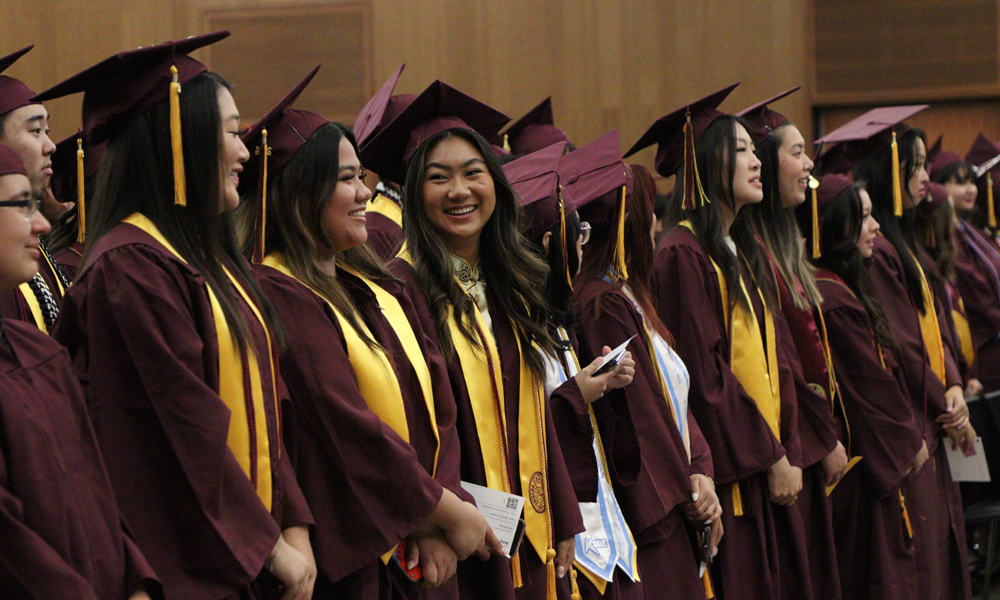Top tips for graduates entering the job market from ASU Career Services

Unending flowers and gifts. A barrage of attention from your family and friends. A week full of celebrations and bright-colored cords. This is the life of a recent Arizona State University graduate: basking in the well-earned warmth of their accomplishments and degrees.
That is until their relatives begin asking those highly dreaded questions that no one likes having to answer: What’s next?
The career search post-graduation can seem daunting and, for many grads, it comes quicker than expected. While it can be appealing to take your time after completing your degree, professionals from ASU Career Services recommend jumping on it sooner rather than later.
Missy McCrickard, assistant director of Career Services at ASU, encourages students to consider their post-grad plan before the big day.
“We hope that they started the search prior to graduation because securing a position takes time,” McCrickard said. “It takes a bit of internal inquiry to find out what a student wants to do after they graduate. ASU Career Services has tools that can help them figure out how their values, interests and majors lead into a fulfilling career.”
According to McCrickard, many students hold some glaring misconceptions about how to search and apply for jobs. One of the main issues students face revolves around their resume and cover letter, both integral parts of any application.
“Students assume they can use the same resume and cover letter when applying for a bunch of different positions when, in reality, it’s a matter of quality over quantity,” McCrickard said. “Making sure your resume and cover letter are truly tailored for each job that they’re applying to is the best way forward.”
McCrickard offered advice on refining resumes and cover letters, emphasizing the importance of precision over vagueness.
“What I want to see as a hiring manager and what I know recruiters want to see are the specifics,” McCrickard said. “A hiring manager wants to know about a student’s impact on their organization. While you might want to talk about soft skills or human skills like leadership and communication, the employer wants you to prove you have those skills.”
For example, if a student held a position in event planning, they should provide details about a particular event and what they learned from that experience. According to McCrickard, this emphasis on practical examples will ensure the employer has no doubt about the student’s skill set.
On a similar note, McCrickard advised students to only include work experience from their time at university and to refrain from adding high school positions.
“We recommend not listing high school positions because the accomplishments that a student has completed in higher education at ASU will hopefully relate more to the positions they’re going after,” McCrickard said. “If you don’t have an abundance of work experience, you can actually include any significant projects from class on your resume.”
In addition to encouraging students to be intentional with their applications, McCrickard warned against using generative artificial intelligence software as a total supplement rather than an aid.
“Something we’re seeing a lot is that students are using ChatGPT and other generative AI platforms to create documents for them, instead of using that software as a tool,” McCrickard said. “We are in the process of putting together guidelines on how to use AI properly, to help generate ideas, because right now our students are not using them in the right ways.”
McCrickard stressed the importance of applications in landing a dream job after graduation.
“These kinds of things are really crucial,” McCrickland said. “If students or recent alumni have questions about the process, as it can be hard to grasp, we can assist.”
ASU Career Services has an abundance of resources available to current students and university alumni.
First is PathwayU, a digital career exploration platform that examines a student’s personality and matches it to a cluster of potential careers. To get matched, students take a few personality assessments which will give the platform an idea of their interests, values and core identity traits.
“It gives students a great starting point for their search when they have broad majors,” McCrickland said. “It can be really daunting, answering the question of where you belong in the workforce, and PathwayU gives you that little bit of direction.”
In addition, McCrickland recommended ‘What can I do with this major?’ to students looking for guidance before graduation. This resource helps Sun Devils see how their degree might fit into potential career paths.
“Once they know the job titles, we suggest students research in Job Market Insights, a tool that pulls information from the Bureau of Labor Statistics,” McCrickland said. “It will tell students lots of relevant information about the position or industry they might be interested in.”
Other innovative tools from ASU Career Services include VMock, a platform that utilizes AI and algorithms to review and grade resumes, and Big Interview, a resource that helps students familiarize themselves with interview etiquette.
When asked what she would say to an anxious student beginning their career search, McCrickland validated those feelings.
“The job search process can be very overwhelming,” McCrickland said. “It is important to remember that they are not alone, and that most people feel that way at some point during their job search. They can always schedule an appointment with Career Services, and we can work to strategize and make them a plan.”
To access appointments with ASU Career Services, students should navigate to their ASU Handshake account and book with a counselor. Embarking on a career journey may seem challenging, but with the right preparation and support, Sun Devils can navigate the transition confidently and successfully.